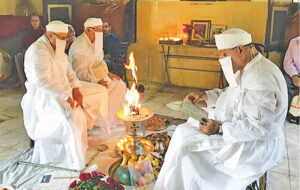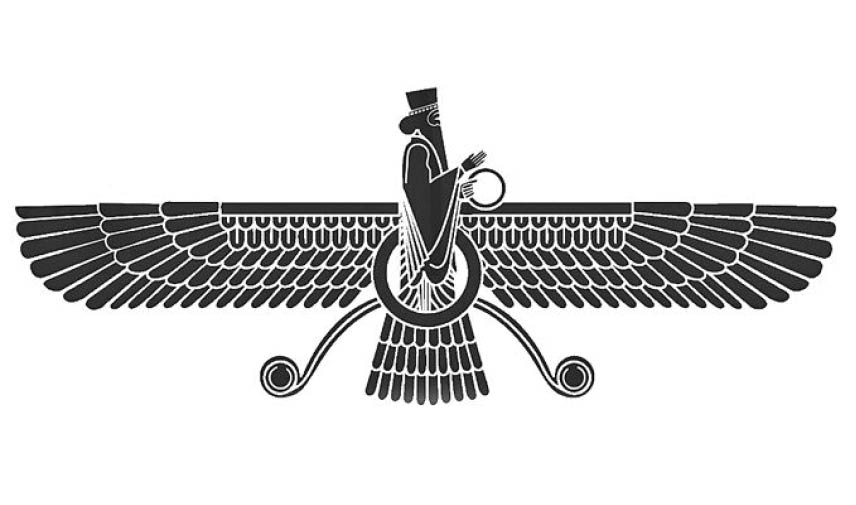 Today, (Mah – Fravardin; Roj – Fravardin) marks the Parab of Fravardin – the day on which the Roj (day) and Mah (month) coincide. On this blessed day, we remember the Fravashi of our dear departed with devotion either from our home, a local Agyari or at the place where their mortal remains are consigned.
Today, (Mah – Fravardin; Roj – Fravardin) marks the Parab of Fravardin – the day on which the Roj (day) and Mah (month) coincide. On this blessed day, we remember the Fravashi of our dear departed with devotion either from our home, a local Agyari or at the place where their mortal remains are consigned.
At the Doongerwadi (literally meaning orchard or garden on the hill) in Mumbai, hundreds of Parsis will congregate from early morning till late eve, to offer respect and prayers to the immortal spirit of their loved ones.
Fravardin – The Auspicious First Month: Fravardin is the very first month of the Zoroastrian calendar and in the very first week of the month of Fravardin, there are several significant days:
- Mah Fravardin, Roj Hormuzd (New Year)
- Mah Fravardin, Roj Ardibehesht (Day to consecrate Rapithwin)
- Mah Fravardin, Roj Khordad (Khordadsaal and traditionally Asho Zarathushtra’s Birthday)
- Mah Fravardin, Roj Amardad (Amardadsaal to celebrate eternity of the Fravashis)
Fravardin Roj is the nineteenth day of the Mah and is considered particularly auspicious when it falls in the first Mah or month of Fravardin.
What Is Fravashi?
Fravashi is somewhat similar to the Pitri of the Hindus or the Manes of the Romans and Greeks – the Beneficent Spirit. Zoroastrians view Fravashi or Farohar as a Divine Essence, which is wholly pure and good. It is not to be confused with the Ruwan or the soul.
The Avestan term Fravashi comes from the word ‘Fra (to take forward) and ‘vaksh’ (to grow). Hence, Fravashi is that spiritual essence or spiritual energy that takes every good creation of Ahura Mazda forward and helps it to grow.
Fravashi is also the prototype, which is believed to have existed prior to manifestation of the material creation. Even Ahura Mazda and His Divine Energies, the Amesha Spentas and the Yazatas, are said to have their own Fravashi. Plants, animals, mountains and rivers also have their own Fravashi. They are guardian spirits of the souls of the dead and protect and guide the souls of the living, as well.
Cosmically, Fravashi are divided into three groups — the Living, the Dead, and the Unborn. They are the force upon which Ahura Mazdā depends to maintain the cosmos against demonic forces. They protect all sacred fires and symbolically keep darkness imprisoned in the world.
What Is Parab?
Parab is a Gujarati term which literally means holiday (holy day) or festival. The equivalent corresponding Pahlavi term would be Jashan or celebration (festival). Every Parab is also observed with a thanksgiving Jashan ceremony. Jashan is the Gujarati equivalent of the Persian term Jashne. In Avesta it would be Yasna (Sanskrit Yajna). The Jashan ceremony involves offering litany to the fire (Atash Nyaish) as also the Afringan which is prefaced by the Pazand Dibache propitiating the souls of the departed.
The Parab Of Fravardin:
Roj Fravardin of Mah Fravardin marks the day when devout Zoroastrians head for the Dokhma or Aramgah in their city, town or village to offer prayers to the Fravashi of their dear departed. One could say it is observed as the Zoroastrian ‘All Souls’ Day’ or more appropriately, the day dedicated to the collective ‘Holy Spirit’ of all creation.
Prayers And Rituals:
Usually, a Jashan is performed where members of the community participate, often in very large numbers. This is followed by a Hum Bandagi or a mass congregational prayer to propitiate the Holy Fravashi. Individually, devotees pray the Stum no Kardo offering fruits and food items to the Fravashi of their dear departed. Many also pray the Fravardin Yasht or hymn to the Holy and Righteous Fravashis.
Fravardin Yasht:
Among Zoroastrian Yashts (hymns) Fravardin is the longest with 158 verses. It mainly propitiates the Righteous Fravashi. Through the Yasht, we pray: “Ashaaunaam vanguhish suraao spentaao fravashayao yazamaidé,” which means: “We remember with reverence the holy, good, brave, prosperity giving Fravashi of the Holy.”
In the Fravardin Yasht, Fravashi is described as a purifier and a powerful helper of Ahura Mazda in protecting all good creations. In the Fravardin Yasht we also pray: “We worship the good, strong, beneficent Fravashi of the faithful; whose friendship is good, and who know how to benefit; whose friendship lasts long; who like to stay in the abode where they are not harmed by its dwellers; who are good, beautiful, afar, health-giving, of high renown, conquering in battle, and who never do harm.”
To conclude with an affirmative verse from the Fravardin Yasht: “May (they) who (are) the Fravashi of the righteous keep love over us here (i.e. in this world) quickly and verily! (And) may they come to our help! (Also) may those (Fravashi) save us, the living ones with (their) powerful help at the time of calamity! (Besides, may those Fravashi (be) (our) helpers through Ahura Mazda, through the brave righteous Sraosha Yazata, and through the learned Mānthra Spenta! Which (Mānthra Spenta) is opposed to the doctrines of daevas and the messenger of Ahura Mazda, whom (the Prophet) Zarathushtra saw with the sincerest vision in the corporeal world.”
- Lessons Of History – Darius III And The Fall Of The Achaemenid Empire - 3 May2025
- The Sacred Ash Of Reinforcement, Resilience And Renewal - 26 April2025
- Birthday Of The Hearth Fire - 19 April2025
